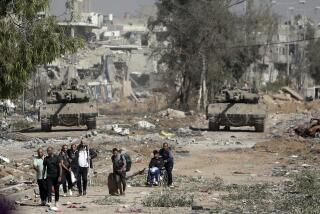Labor Party Approves Israeli Coalition; New Government to Take Office Today
- Share via
JERUSALEM — A new government led by old faces is scheduled to take power in Israel today, one that will face not only serious diplomatic challenges and unrest among rebellious Palestinians but also a faltering economy beset by rising unemployment, higher prices and slow growth.
The formation of a coalition between the right-wing Likud and center-left Labor parties was sealed Wednesday when Labor members approved the coalition pact, ending 51 days of political horse-trading that followed inconclusive parliamentary elections Nov. 1.
Prime Minister Yitzhak Shamir, 73, will head the government, staying in the post he held in the past two years of a Likud-Labor coalition government. Labor, led by outgoing Foreign Minister Shimon Peres, will participate as a junior partner but with significant power in economic matters--a major impetus for its agreement to join.
In contrast to Likud’s raucous nine-hour meeting that narrowly approved the pact early Wednesday, Labor’s decision went quietly, although there was some dissent from young members of the party who said Labor was selling its soul to a right-wing foe.
“A statesman worries about the next generation, and a politician worries about the next election,” Labor member Chaim Ramon said in an attack on Peres. “I believe that by joining this government, we are ignoring both the next generation and the next elections.”
Diplomatic Setbacks
Peres argued that the recent U.S. decision to talk to the Palestine Liberation Organization, along with other diplomatic setbacks for Israel, made a broad-based government a national necessity. “If a joint government with Likud and Labor had not been set up, this process of isolation and conflict with the world would have persisted,” Peres remarked.
In a version of musical chairs among veteran top leaders, Peres, 65, will move from the Foreign Ministry to Finance. Labor’s Yitzhak Rabin, 67, remains as the head of the Defense Ministry. Likud’s Moshe Arens, 64, a minister without portfolio in the old government, replaces Peres as foreign minister.
In all, Likud and Labor will divide about 20 government posts between them, with a handful left over for two religious parties that have decided to participate.
The government is expected to be installed today during a session of the Knesset, Israel’s Parliament.
The ruling arrangement makes for a stable government, experts say, but may result in a lack of daring in confronting the double whammy of foreign policy and economic challenges.
“We cannot expect to see bold, imaginative responses to the problems facing us,” said Yaron Ezrahi, a political theorist at Hebrew University.
Ezrahi pointed out that Shamir has made it clear that he sees the broad coalition as a bulwark against pressures to talk peace with the PLO, which recently declared an independent state adjoining Israel.
To fend off outside pressures, Shamir had to ensure Peres’ removal from the Foreign Ministry and, with him, Labor’s yearning to join internationally organized peace talks, Shamir’s aides said. Just a few weeks ago, Peres insisted that he would not be part of a government that was not in favor of the negotiations. The Likud-Labor pact says nothing of such talks.
In Washington, Morris B. Abram, chairman of the Conference of Presidents of Major American Jewish Organizations, quoted Secretary of State George P. Shultz as saying that the newly formed coalition government is more likely than a narrow right-wing regime to “move the peace process forward.”
Abram spoke to reporters after he and several other Jewish leaders met for more than an hour with Shultz to seek clarification of the U.S. decision last week to open a dialogue with the PLO.
He said Shultz reiterated his public assertions that the U.S. dialogue with the PLO does not indicate any reduction in American support for Israel’s security.
Strong Hand in Economy
In the end, Peres and his party discarded foreign policy principles in return for a strong hand in the economy, an area that may soon become critical.
“There was tremendous pressure from within the party for Peres to agree to stay in government and safeguard party interests,” said Ora Namir, a Labor member.
Israel faces a decaying economy. Unemployment has risen to more than 7%--with 5% considered an acceptable upper limit. Exports are declining due to an overvalued currency. A devaluation of the shekel has been postponed, bankers say, because both Likud and Labor wanted to avoid angering voters during the political season.
The economy stagnated this year; little growth is expected in 1989. The slowdown is reflected in a sharp decrease in clothing purchases, except at second-hand stores, where sales are booming, economists say.
Thus, the government faces some hard and perhaps unpopular choices, including a need to keep the lid on wage demands. By bringing his rivals into the government, Shamir may avoid problems with trade unions, particularly the biggest federation of unions, Histadrut, which is linked with the Labor Party.
Leaders of Histadrut seem to sense this motive. Earlier this week, union official Chaim Haberfeld warned that the 1.5-million-member union federation “would not hesitate to fight measures that do not meet with the best interests of the labor force”--notwithstanding Peres’ position in the Finance Ministry.
Besides immediate problems, Israel is undergoing dislocations stemming from a drive to radically change its economy from a paternalistic, socialist style to a wide-open, free-enterprise model.
For many years, Israel operated under an economic model common to Western Europe and other parts of the world after World War II: The government bought or created industries to ensure employment and production, and the ruling party often linked itself to powerful unions to guarantee political support.
Israel’s Labor Party, through Histadrut, owns banks, supermarkets, department stores, dairies, newspapers, insurance companies and other enterprises that touch on the daily life of the average Israeli. Even the country’s system of public health clinics, from which the vast majority of Israelis receive medical care, is owned by Histadrut.
But Labor’s empire has been crumbling. Not only has the party been unable to win an election outright for 12 years, but many of its allied businesses, as well as communal-style farms, are failing. The total debt of Israeli kibbutzim and moshavim, the pioneer rural establishments in Israel, amounts to some $5 billion--fully one-sixth of the country’s gross national product.
Labor’s grip on key economic posts--the Finance Ministry and the finance committee of the Knesset--are seen as means to ease the decline of its industrial and farm network by keeping lines of funding open.
“However,” warned analyst Ezrahi, “Peres must balance a temptation to build political power by spending money with the need to make the economy sound.”
Among the obstacles to economic repair is the Arab uprising in the West Bank and Gaza Strip. The rebellion has reduced the flow of low-paid workers into Israeli industry, notably construction, as well as diminished the market for Israeli goods.
The uprising continues, albeit at a slightly slower pace than before. On Wednesday, there was a general strike in the occupied territories. Youths in Bethlehem burned tires on main roads, a gesture evidently aimed at discouraging Arab workers from traveling to work in Israel.
Israeli troops shot and wounded four Palestinians in stone-throwing clashes, and a Palestinian died from chest wounds received when the army fired on protesters and rock throwers in Nablus last Friday.
Times staff writer Norman Kempster in Washington contributed to this article.
More to Read
Sign up for Essential California
The most important California stories and recommendations in your inbox every morning.
You may occasionally receive promotional content from the Los Angeles Times.













